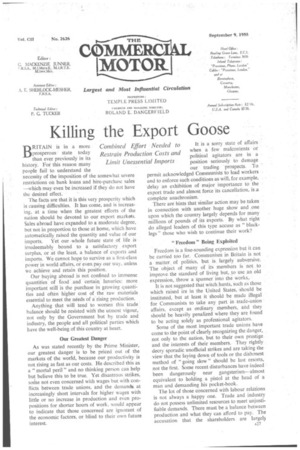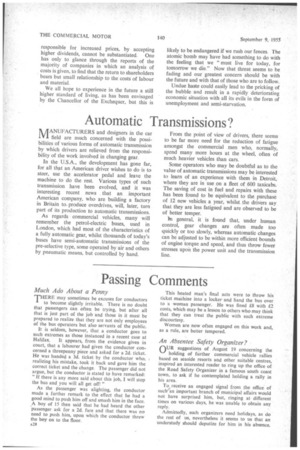Killing the Export Goose
Page 29

Page 30

If you've noticed an error in this article please click here to report it so we can fix it.
BRITAIN is in a more prosperous • state today than ever previously in its historY. For this reason many people fail to understand the necessity of the imposition of the somewhat severe restrictions on bank loans and hire-purchase sales —which may even be increased if they do not have the desired effect.
The facts are that it is this very prosperity which is causing difficulties. It has come, and is increasing, at a time when the greatest efforts of the nation should be devoted to our export markets. Sales abroad have expanded to a moderate degree, but not in proportion to those at home, which have automatic,ally raised the quantity and value of our imports. Yet our -whole future state of life is irredeemably , bound to a satisfactory export surplus, or at the least, a balance of exports and imports. We cannot hope to survive as a first-class power in world affairs, or even. pay our way, unless we achieve and retain this position.
Our buying abroad is not confined to immense quantities of food and certain, luxuries: more important still is the purchase in growing quantities and often higher cost of the raw materials essential to meet the needs of a rising production.
Anything that will tend to worsen this trade• balance should be resisted with the utmost vigour,* not only by the Government but by trade and industry, the people and all political parties which have the well-being of this country at heart.
Our Greatest Danger As was stated recently by the Prime Minister, our greatest danger is to be priced out of the markets of the world, because our productivity is not rising as fast as our costs. He described this as a "mortal peril" and no thinking person can help but believe this to be true. Yet disastrous strikes, some not even concerned with wages but with conflicts between trade unions, and the demancli at increasingly short intervals for higher wages with little or no increase in production and even propositions for shorter hours of work, would appear to indicate that those concerned are ignorant of the economic factors, or blind to their own future interest it is a sorry state of affairs when a few malcontents or political agitators are in a position seriously to damage our trading prospects. TO permit acknowledged Communists to lead workers and to enforce such conditions as will for example, delay an exhibition of major importance to the export trade and almost force its cancellation, is.a complete anachronism. There are hints that similar action may be taken in connection with another huge show and one upon which the country largely depends for many millions of pounds of its exports. By what right do alleged leaders of this type accuse as "blacklegs" those who wish to continue their work?
" Freedom " Being Exploited Freedom is a fine-sounding expression but it can be carried too far. Communism in Britain is not a matter, of politics, but is. largely subversive. The object of many of its members is not to improvethe standard of living but, to use an old expression, throw a spanner into the works..
It is not suggested that witch hunts, such as those which raised ire in the United States, should be instituted, but at least it should be made illegal for Communists to take any, part in trade-union affairs, except as ordinary members, and they should be heavily penalized where they are found to be acting solely as professional agitators.
Some of the most important trade unions have come to the point of clearly recognizing the danger, not only to the nation, but to their own prestige and the interests of their members. They rightly decry sporadic unofficial strikes and are taking the view that the laying down of tools or the dishonest method of "going slow" should be last resorts, not the first. Some recent disturbances have indeed been dangerously near gangsterism—almost equivalent to holding a pistol at the head of a man and demanding his pocket-book.
The lot of those concerned with labour relations is not always a happy one. Trade and industry do not possess unlimited resources to meet unjustifiable demands. There must be a balance between production and what they can afford to pay. The accusation that the shareholders are largely responsible for increased prices, by accepting higher dividends, cannot be substantiated. One has only to glance through the reports of the majority of companies in which an analysis of costs is given, to find that the return to shareholders bears but small relationship to the costs of labour and material.
We all hope to experience in the future a still higher standard of living, as has been envisaged by the Chancellor of the Exchequer, but this is likely to be endangered if we rush our fences. The atomic bomb may have had something to do with the feeling that we " must live for today, for tomorrow we die." Now that threat seems to be fading and our greatest concern should be with the future and with that of those who are to follow.
Undue haste could easily lead to the pricking of the bubble and result in a rapidly deteriorating economic situation with all its evils in the form of unemployment and semi-starvation.




























































































